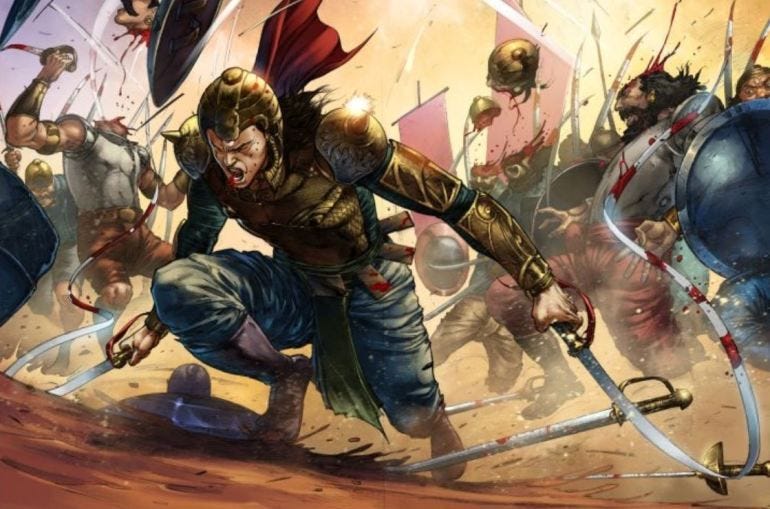Partial knowledge, pitfalls and what you can learn?
Partial knowledge is bad, for it gives you an impression of being knowledgeable while robbing you of the curiosity needed to learn.
It leads to an erroneous conclusion of mastery, which turns detrimental when such a conclusion is tested. It is the source of invisible errors which accumulate, until the time is ripe for it to blow in your face.
You’re taken aback when such mistakes become visible, the consequences manifest and it is too late for rectification.
This piece is about partial knowledge and lessons to be learned, explained through a story from Indian history.
The story of Abhimanyu
The story of the mighty warrior Abhimanyu, in the epic Mahabharata, is a great example for illustrating the ill effects of partial knowledge.
Abhimanyu, son of the Pandava warrior Arjuna1, had established himself as a pain in the ass for the Kauravas, by inflicting heavy casualties during the Kurukshetra war that spanned over a period of 18 days.
On 13th day of the war, the Kaurava commander-in-chief, Dronacharya (also teacher to Arjuna) decided to initiate a spinning wheel/maze like battle formation, termed chakravyuha to turn the heat on Pandavas. The goal was to trap Yudhishtira, the eldest of Pandava brothers.
The formation was an offense and a defense strategy meant to trap, weaken and capture the target or eliminate the target.
The two people in the Pandava camp who knew to break-in and out of the formation while decimating the opposition were Krishna and Arjuna. They were kept busy elsewhere and hence unavailable.
It would be impossible to breach the formation without entering the formation and hence the predicament. This is when Abhimanyu took up the task. He entered, fought valiantly and died.
He knew to enter the formation, which he learnt while in the womb (so the story goes2), but never got around to learning how to get out of it.
Lessons from the story
This story is used as a great example to illustrate the ill effects of partial knowledge.
You may very well be on the right side, with right education, but if you’re partaking in a pursuit with partial knowledge, it will cause harm.
However, there is more depth to the very same point, which is the main content of this post.
Here are the 5 lessons:
Lesson #1: Make hay while the sun shines.
Partial knowledge can be detrimental. In the case of Abhimanyu, he had to pay the price with his life. Hence, make hay while the sun shines, don’t start to dig the well after getting thirsty and acquire the necessary knowledge, while the days are bright.
Lesson #2: Be prepared for any eventuality.
Irrespective of how diligent you were in your learning process, there are bound to be situations when you have to jump into the battle unprepared or partially prepared. Do not shy away from responsibilities and duties when you receive your calling. Be Abhimanyu - fearless, and courageous.
Lesson #3: Do not lose yourself.
True knowledge is a two way travel . It is not sufficient to go deep into the ocean of knowledge, although this is what is usually valued. It is equally important to swim back to the surface. Otherwise, you risk being stuck at the bottom and drown or crumble under the weight of your own knowledge. Getting out is more difficult than going in.
Lesson #4: Knowledge must be humbling
You might be valiant, well versed, mighty and yet comes the downfall. The death of Abhimanyu can be considered as the death of ego. Not that he was egoistic, but a connection can be made regarding the humbling effect of knowledge on ones character. Lack of humility is ignorance.
Lesson #5: Presence of humility is not inaction
Abhimanyu had humility for he acknowledged his lack of knowledge on exiting the formation. However, it did not deter him from taking action. He took the chance conditioned on the partial knowledge and demands of the situation3.
Speculation
I have wondered for a while, if the circular maze or the spinning wheel maze tactic is used in a battlefield, it is used to trap enemies.
Dronacharya was a master in military tactics, not a newbie. Implication is that the maze is designed to be easily penetrated, to trap the enemy and to bait the enemy.
Perhaps I am wrong. Either ways the following bonus lesson holds true.
Bonus Lesson: If it’s easy it might not be due to virtue of your knowledge.
Do not declare knowledge or celebrate victory because you won the first of battles. The true battle starts after initial victories. You receive applause when you’re half way through, when you get a good start. It gives you an impression that you’ve made it.
Always ask: How do you know there isn’t more to it?
Your journey starts after applause. After, WAGMI.
WAGMI is for Kings, the after journey is for Gods.
If you liked this piece subscribe and feel free to forward this email with your friends and family, not on twitter or substack. If you are reading this and have not subscribed, you can do that below, to receive my essays in your inbox.
Footnotes
Arjuna is the third among five Pandava brothers, an archer and a warrior par excellence, virtuous and fortunate to have Krishna as his charioteer during the war. He was also the fortunate soul, who received the knowledge of Bhagadvad Geeta from Krishna himself (at the beginning of the war).
This a household story in India, and hence I reproduce the story from memory. Someday when I get to reading the verses of Mahabharata, I would know the exact details. The main story line remains the same.
Lesson #5 is not the same as Lesson #2. Former alludes to decision making or taking necessary actions and the latter alludes to taking responsibility.



